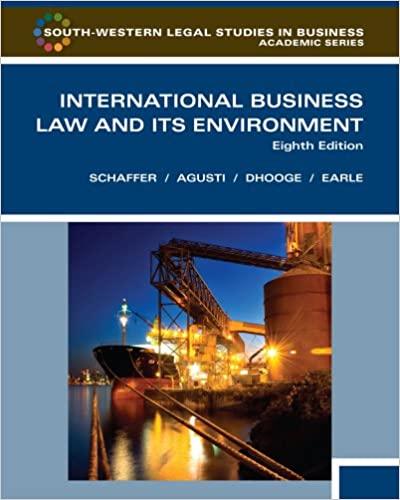Question
Read the fact pattern below, then answer the questions that follow. Finch v. Raymer [1] Facts : Tina Raymer ran a cleaning service, while Jeffrey
Read the fact pattern below, then answer the questions that follow.
Finch v. Raymer[1]
Facts: Tina Raymer ran a cleaning service, while Jeffrey Finch was a carpenter and boilermaker. A few months after they began dating, he moved into her mobile home. When the mobile home caught fire, the couple devised a business plan: Together, they would repair it, sell it, and then split the proceeds. But the deal changed slightlyinstead, of splitting the profit, they deposited it in a joint checking account, along with all their other income.
On that momentum, Raymer "flipped"or bought, remodeled, and soldanother house. Then Raymer decided she would like to build a house. She and Finch worked on the project together, visiting land and meeting sellers. But on the day that Raymer bought land on Pack Hill Road Finch was at work. He knew that both the mortgage and the deed to the property were in her name alone. Finch and Tina's father then worked together to build a house on the property, which the couple moved into. Raymer and Finch paid the mortgage, their living expenses, and all business expenses out of their joint checking account.
Some months later, Finch sold a house that he had owned before he met Raymer and used the proceeds to pay off the mortgage on Pack Hill. The couple then took out a loan on the Pack Hill house to flip 12 more properties. All the proceeds from these sales went into their joint checking account, even though only nine were jointly owned.
Raymer worked full time in this real estate business, managing the finances and also doing some of the renovations. Finch worked part-time on the renovations between boilermaker jobs. As the couple's profits grew, they buried $80,000 in cash in an ammunition box underneath the Pack Hill house.
When the couple ultimately broke up, they divided the money in the ammunition box equally. Finch also took half the funds in the joint checking account, and then removed his name, leaving Raymer with the balance. All was smooth until it came to the Pack Hill property and furnishings. She claimed that it was all hers.
Finch filed suit against Raymer, alleging that their partnership owned the Pack Hill property and he was entitled to half its value. Raymer agreed that she and Finch were partners in the other properties but not in Pack Hill.
- What is the issue in this case? What question does the court need to answer to resolve this case?
- What is the rule of law in this case? Remember, the rule of law is the legal principle the court relies upon to resolve the issue.
You are now the judge in this case. Read the arguments below and analyze the case. Then complete the exercise that follows.
Argument for Raymer:
Finch and Raymer did have a partnership, to flip properties. But the Pack Hill house was different: It was a personal residence, not partnership property. That house was never intended to be part of the partnership business, to produce income or profit; she expected to live there forever. It was in Raymer's name alone, which Finch knew. Almost all the other properties were in joint names. All the partnership proceeds were in the ammunition box under the house, which they split evenly.
Raymer worked full time in the business and Finch did not. It is only fair that she gets to keep Pack Hill. Just because Finch was helping to support Raymer, does not mean that Pack Hill was partnership property. People in romantic relationships often make unequal contributions to living expenses. Obviously, their finances were tangled, but one fact remainsthe house was in her name.
Argument for Finch:
To determine if a partnership exists, the courts look at all the circumstances, not just a few technicalities. Finch's name was not on the Pack Hill deed simply because he was at work and could not attend the closing.
Finch and Raymer acted like partnership. They put all of their profits into their joint checking account, the ammunition box, or real estate. Partnership funds and Finch's profit from the sale of his house paid the Pack Hill mortgage and maintenance expenses. Plus, Finch had sweat equity in the househe built it with his own hands. The house is half his.
- Write your case analysis. (You are going to apply the rule of law to the facts in this case with the goal of coming to the answer to the issue, and a conclusion to the case).
- What is your conclusion? How do you rule, your Honor
Step by Step Solution
There are 3 Steps involved in it
Step: 1

Get Instant Access to Expert-Tailored Solutions
See step-by-step solutions with expert insights and AI powered tools for academic success
Step: 2

Step: 3

Ace Your Homework with AI
Get the answers you need in no time with our AI-driven, step-by-step assistance
Get Started


